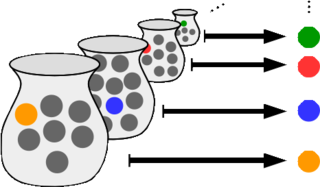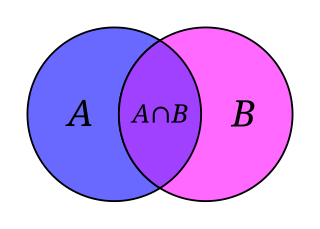
In mathematics, the axiom of choice, abbreviated AC or AoC, is an axiom of set theory equivalent to the statement that a Cartesian product of a collection of non-empty sets is non-empty. Informally put, the axiom of choice says that given any collection of sets, each containing at least one element, it is possible to construct a new set by choosing one element from each set, even if the collection is infinite. Formally, it states that for every indexed family of nonempty sets, there exists an indexed set such that for every . The axiom of choice was formulated in 1904 by Ernst Zermelo in order to formalize his proof of the well-ordering theorem.
In mathematics, specifically set theory, the continuum hypothesis is a hypothesis about the possible sizes of infinite sets. It states:
"There is no set whose cardinality is strictly between that of the integers and the real numbers."
In logic, the law of excluded middle or the principle of excluded middle states that for every proposition, either this proposition or its negation is true. It is one of the three laws of thought, along with the law of noncontradiction, and the law of identity; however, no system of logic is built on just these laws, and none of these laws provides inference rules, such as modus ponens or De Morgan's laws. The law is also known as the law / principleof the excluded third, in Latin principium tertii exclusi. Another Latin designation for this law is tertium non datur or "no third [possibility] is given". In classical logic, the law is a tautology.
In the philosophy of mathematics, intuitionism, or neointuitionism, is an approach where mathematics is considered to be purely the result of the constructive mental activity of humans rather than the discovery of fundamental principles claimed to exist in an objective reality. That is, logic and mathematics are not considered analytic activities wherein deep properties of objective reality are revealed and applied, but are instead considered the application of internally consistent methods used to realize more complex mental constructs, regardless of their possible independent existence in an objective reality.
Mathematical logic is the study of formal logic within mathematics. Major subareas include model theory, proof theory, set theory, and recursion theory. Research in mathematical logic commonly addresses the mathematical properties of formal systems of logic such as their expressive or deductive power. However, it can also include uses of logic to characterize correct mathematical reasoning or to establish foundations of mathematics.
In the philosophy of mathematics, constructivism asserts that it is necessary to find a specific example of a mathematical object in order to prove that an example exists. Contrastingly, in classical mathematics, one can prove the existence of a mathematical object without "finding" that object explicitly, by assuming its non-existence and then deriving a contradiction from that assumption. Such a proof by contradiction might be called non-constructive, and a constructivist might reject it. The constructive viewpoint involves a verificational interpretation of the existential quantifier, which is at odds with its classical interpretation.

Set theory is the branch of mathematical logic that studies sets, which can be informally described as collections of objects. Although objects of any kind can be collected into a set, set theory — as a branch of mathematics — is mostly concerned with those that are relevant to mathematics as a whole.

In mathematics, an infinitesimal number is a non-zero quantity that is closer to 0 than any non-zero real number is. The word infinitesimal comes from a 17th-century Modern Latin coinage infinitesimus, which originally referred to the "infinity-eth" item in a sequence.
Intuitionistic logic, sometimes more generally called constructive logic, refers to systems of symbolic logic that differ from the systems used for classical logic by more closely mirroring the notion of constructive proof. In particular, systems of intuitionistic logic do not assume the law of the excluded middle and double negation elimination, which are fundamental inference rules in classical logic.
Foundations of mathematics are the logical and mathematical framework that allows the development of mathematics without generating self-contradictory theories, and, in particular, to have reliable concepts of theorems, proofs, algorithms, etc. This may also include the philosophical study of the relation of this framework with reality.
In the philosophy of mathematics, logicism is a programme comprising one or more of the theses that – for some coherent meaning of 'logic' – mathematics is an extension of logic, some or all of mathematics is reducible to logic, or some or all of mathematics may be modelled in logic. Bertrand Russell and Alfred North Whitehead championed this programme, initiated by Gottlob Frege and subsequently developed by Richard Dedekind and Giuseppe Peano.
Indecomposability or indecomposable may refer to any of several subjects in mathematics:
In mathematical logic, the disjunction and existence properties are the "hallmarks" of constructive theories such as Heyting arithmetic and constructive set theories (Rathjen 2005).
Axiomatic constructive set theory is an approach to mathematical constructivism following the program of axiomatic set theory. The same first-order language with "" and "" of classical set theory is usually used, so this is not to be confused with a constructive types approach. On the other hand, some constructive theories are indeed motivated by their interpretability in type theories.
In mathematics, a set is inhabited if there exists an element .
In mathematical logic, realizability is a collection of methods in proof theory used to study constructive proofs and extract additional information from them. Formulas from a formal theory are "realized" by objects, known as "realizers", in a way that knowledge of the realizer gives knowledge about the truth of the formula. There are many variations of realizability; exactly which class of formulas is studied and which objects are realizers differ from one variation to another.
Markov's principle, named after Andrey Markov Jr, is a conditional existence statement for which there are many equivalent formulations, as discussed below. The principle is logically valid classically, but not in intuitionistic constructive mathematics. However, many particular instances of it are nevertheless provable in a constructive context as well.
A timeline of mathematical logic; see also history of logic.
This is a glossary of terms and definitions related to the topic of set theory.


